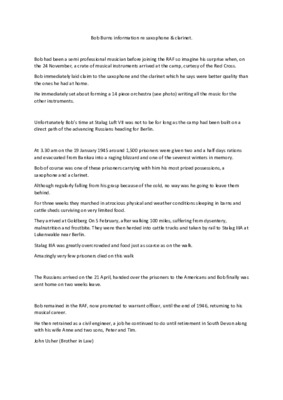Bob Burns information re saxophone and clarinet
Title
Bob Burns information re saxophone and clarinet
Description
Account of Bob Burns (semi-professional musician) formation of orchestra in prisoner of war camp after arrival of Red Cross parcel with saxophone and clarinet. Continues with account of long walk from Silesia to Berlin in January/February 1945 in face of advancing Russians. He carried his saxophone and clarinet.
Creator
Language
Format
One-page printed document
Conforms To
Publisher
Rights
This content is available under a CC BY-NC 4.0 International license (Creative Commons Attribution-NonCommercial 4.0). It has been published ‘as is’ and may contain inaccuracies or culturally inappropriate references that do not necessarily reflect the official policy or position of the University of Lincoln or the International Bomber Command Centre. For more information, visit https://creativecommons.org/licenses/by-nc/4.0/ and https://ibccdigitalarchive.lincoln.ac.uk/omeka/legal.
Contributor
Identifier
BUsherJBurnsDRv3
Transcription
Bob Burns information re saxophone & clarinet.
Bob had been a semi professional musician before joining the RAF so imagine his surprise when, on the 24 November, a crate of musical instruments arrived at the camp, curtesy of the Red Cross.
Bob immediately laid claim to the saxophone and the clarinet which he says were better quality than the ones he had at home.
He immediately set about forming a 14 piece orchestra (see photo) writing all the music for the other instruments.
Unfortunately Bob’s time at Stalag Luft VII was not to be for long as the camp had been built on a direct path of the advancing Russians heading for Berlin.
At 3.30am on the 19 January 1945 around 1,500 prisoners were given two and a half days rations and evacuated from Bankau into a raging blizzard and one of the severest winters in memory.
Bob of course was one of these prisoners carrying with him his most prized possessions, a saxophone and a clarinet.
Although regularly falling from his grasp because of the cold, no way was he going to leave them behind.
For three weeks they marched in atrocious physical and weather conditions sleeping in barns and cattle sheds surviving on very limited food.
They arrived at Goldberg On 5 February, after walking 100 miles, suffering from dysentery, malnutrition and frostbite. They were then herded into cattle trucks and taken by rail to Stalag IIIA at Lukenwalde near Berlin.
Stalag IIIA was greatly overcrowded and foot just as scarce as on the walk.
Amazingly very few prisoners died on this walk
The Russians arrived on the 21 April, handed over the prisoners to the Americans and Bob finally was sent home on two weeks leave.
Bob remained in the RAF, now promoted to warrant officer, until the end of 1946, returning to his musical career.
He then retrained as a civil engineer, a job he continued to do until retirement in South Devon along with his wife Anne and two sons, Peter and Tim.
John Usher (Brother in Law).
Bob had been a semi professional musician before joining the RAF so imagine his surprise when, on the 24 November, a crate of musical instruments arrived at the camp, curtesy of the Red Cross.
Bob immediately laid claim to the saxophone and the clarinet which he says were better quality than the ones he had at home.
He immediately set about forming a 14 piece orchestra (see photo) writing all the music for the other instruments.
Unfortunately Bob’s time at Stalag Luft VII was not to be for long as the camp had been built on a direct path of the advancing Russians heading for Berlin.
At 3.30am on the 19 January 1945 around 1,500 prisoners were given two and a half days rations and evacuated from Bankau into a raging blizzard and one of the severest winters in memory.
Bob of course was one of these prisoners carrying with him his most prized possessions, a saxophone and a clarinet.
Although regularly falling from his grasp because of the cold, no way was he going to leave them behind.
For three weeks they marched in atrocious physical and weather conditions sleeping in barns and cattle sheds surviving on very limited food.
They arrived at Goldberg On 5 February, after walking 100 miles, suffering from dysentery, malnutrition and frostbite. They were then herded into cattle trucks and taken by rail to Stalag IIIA at Lukenwalde near Berlin.
Stalag IIIA was greatly overcrowded and foot just as scarce as on the walk.
Amazingly very few prisoners died on this walk
The Russians arrived on the 21 April, handed over the prisoners to the Americans and Bob finally was sent home on two weeks leave.
Bob remained in the RAF, now promoted to warrant officer, until the end of 1946, returning to his musical career.
He then retrained as a civil engineer, a job he continued to do until retirement in South Devon along with his wife Anne and two sons, Peter and Tim.
John Usher (Brother in Law).
Collection
Citation
J Usher, “Bob Burns information re saxophone and clarinet,” IBCC Digital Archive, accessed October 29, 2024, https://ibccdigitalarchive.lincoln.ac.uk/omeka/collections/document/40708.
Item Relations
This item has no relations.

